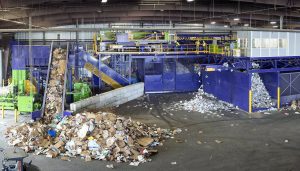The U.S. paper recovery rate edged up slightly in 2014, according to data from an industry group.

The U.S. paper recovery rate edged up slightly in 2014, according to data from an industry group.
The Society of the Plastics Industry hosted a webinar on July 2 to address some ongoing questions about China’s Operation Green Fence enforcement operation.
 Since 1978, the National Recycling Coalition (NRC) has been evolving and working to meet the needs of those engaged in recycling activities. Over those 38 years, NRC has advanced many issues and programs, such as organizing the National Recycling Congress, hosting many working task forces, and working with Congress on legislative initiatives and the White House on executive orders.
Since 1978, the National Recycling Coalition (NRC) has been evolving and working to meet the needs of those engaged in recycling activities. Over those 38 years, NRC has advanced many issues and programs, such as organizing the National Recycling Congress, hosting many working task forces, and working with Congress on legislative initiatives and the White House on executive orders.

Kelly Semrau, SC Johnson
For years, the plastics recycling sector has aimed to keep plastic film out of curbside bins and carts, in an effort to both keep the material clean and avoid the well-documented problems bags and other items cause at recycling facilities.
 Recycling organizations will try to sell Congress on the economic and environmental benefits of the U.S. EPA’s Waste Minimization and Recycling program, which is cut in President Trump’s proposed budget.
Recycling organizations will try to sell Congress on the economic and environmental benefits of the U.S. EPA’s Waste Minimization and Recycling program, which is cut in President Trump’s proposed budget.
![]() Operators of residential recycling programs report up-and-down pricing moves for recovered plastic and aluminum packaging.
Operators of residential recycling programs report up-and-down pricing moves for recovered plastic and aluminum packaging.
 Funding for a North Carolina recycling support program has been restored in the state House of Representatives’ budget proposal, a sharp departure from the Senate’s desire to slash the office entirely.
Funding for a North Carolina recycling support program has been restored in the state House of Representatives’ budget proposal, a sharp departure from the Senate’s desire to slash the office entirely.
 Three optical sorters and a variety of screening technologies form the upgraded backbone of a recently re-opened California MRF.
Three optical sorters and a variety of screening technologies form the upgraded backbone of a recently re-opened California MRF.
 Discussion of how China’s National Sword campaign is affecting the North American recycling industry continued to draw our readers’ attention in May.
Discussion of how China’s National Sword campaign is affecting the North American recycling industry continued to draw our readers’ attention in May.
 Materials recovery facilities have long been vocal about the impacts they’re seeing from a shifting waste stream. A new group is now aiming to elevate the voice of compost operations in that conversation.
Materials recovery facilities have long been vocal about the impacts they’re seeing from a shifting waste stream. A new group is now aiming to elevate the voice of compost operations in that conversation.
